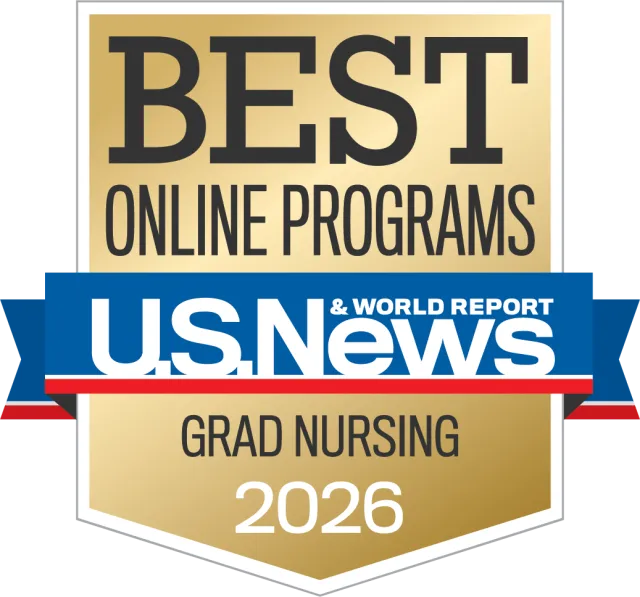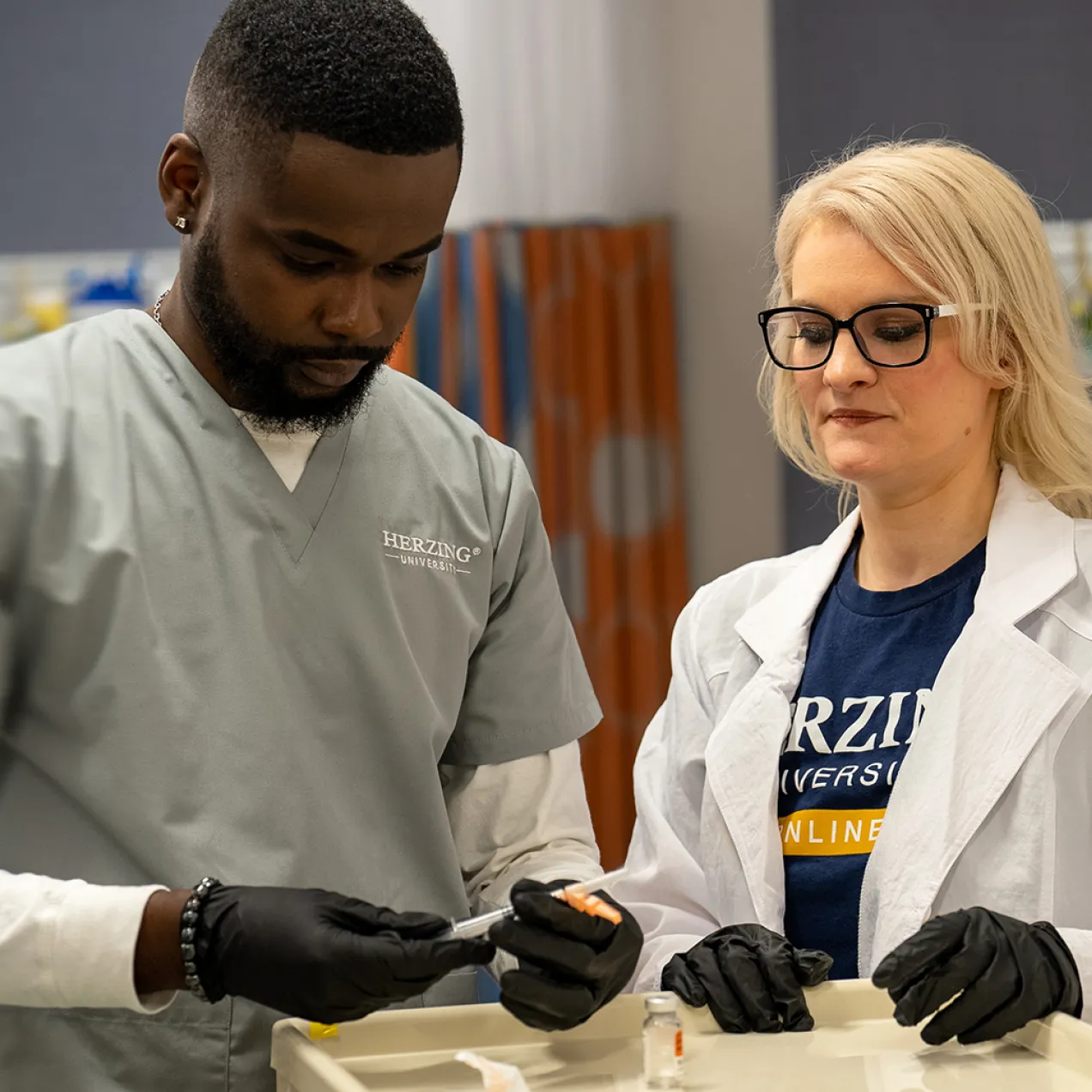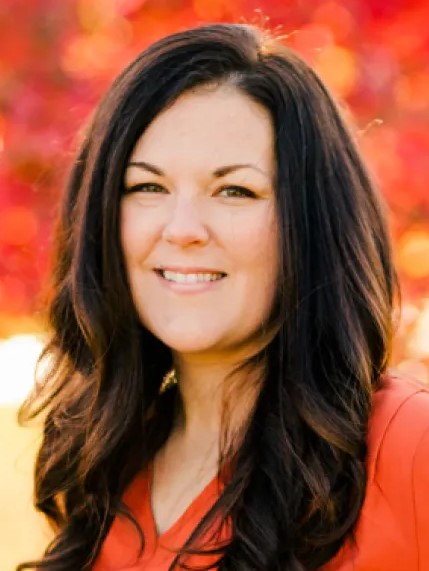Earn an MSN and become a nurse educator
| Accreditation | CCNE accredited,1 Accredited by the Higher Learning Commission |
|---|---|
| Paying for school | You can earn up to 85% in loan forgiveness through the Nurse Faculty Loan Program (NFLP)2 |
| Format | 100% online coursework flexible to accommodate your lifestyle |
| Certification | Prepare to sit for the Certified Nurse Educator (CNE) exam from the National League for Nursing (NLN) upon graduation |
| Dual credit | Earn dual credit towards a Doctor of Nursing Practice (DNP) |
| QuickPaths | Earn an MSN required to enroll in a Doctor of Nursing Education program; Transfer credit, stackable credentials, and adaptive learning technology build a faster pathway to a higher education with Herzing University |
Learn More Today!

Ranked by U.S. News & World Report as one of the best online graduate nursing programs in 2026
Overview: MSN in Nursing Education (BSN to MSN)
The MSN in Nursing Education degree is a 36-credit graduate program which prepares BSN nurses for a career as a nurse educator. The degree program provides students with fundamental knowledge and skills in teaching/learning strategies, curriculum development, theoretical foundations for nursing, and more.

Career-focused curriculum
Discover the crucial knowledge and skills required to succeed in your work and build a foundation for continued career growth.
Flexible schedule
We work hard to help you maintain school-life balance, striving to be as flexible as possible for busy non-traditional students.
Virtual services
Access to extensive virtual services, including academic advising, tutoring, support services, technical support and library services.
Lifelong support
We support your ongoing career advancement by providing comprehensive, personalized student services with lifelong career coaching.
Rolling admissions
No application deadlines to worry about. Apply when you’re ready and prepare to get started soon.
MSN in Nursing Education Program Curriculum
You'll find that the MSN in Nursing Education program includes courses on teaching strategies, curriculum development and nursing education roles. Following graduation, you'll be prepared to apply for the certified nurse educator examination.
Options for RNs with an ADN
We also offer an RN to MSN in Nursing Education program for nurses who hold associate degree in nursing.
Choose to go from RN to MSN or earn your BSN on the way in our RN to BSN to MSN track.
| Program | Months i | Semester Credits |
|---|---|---|
| Master of Science in Nursing (MSN) in Nursing Education | 16 | 36 |
i. Average number of months for students to complete program. Program availability varies by location.
Required Core Courses
All courses, 15.00 semester credit hours, are required.
Required Direct Care Courses
All courses, 9.00 semester credit hours, are required.
Required Specialty Courses
All courses, 12.00 semester credit hours, are required.
Tuition & Cost
Tuition & Cost
The cost of tuition for the MSN in Nursing Education program is $630 per credit.
You can potentially earn even greater savings by transferring credit from prior college coursework, applying for financial aid, or potential partnership opportunities through your employer.
Our goal is your career advancement. That’s why we are always working to improve our curriculum and processes to make our program as affordable as possible while preparing you best for success in your work.
Scholarships & Financial Aid
You may be eligible for multiple scholarships and grants—including our Nurses Circle of Achievement scholarship, which offers up to 10% tuition reduction.
Military/Veteran Discounts
Veterans, Active Duty U.S. Servicemembers, and spouses may qualify for a 10-20% tuition discount.
You can earn up to 85% in loan forgiveness through the NFLP.
Commit to a career as a nursing instructor and you can potentially save immensely on cost as part of the National Faculty Loan Program (NFLP).
You’ll need to find a full-time position within 12 months after graduation. The longer you remain employed full-time, the more you can save—up to 85% over 4 years.2

Scholarship Opportunitiy
You may be eligible for the Herzing University Nurses Circle of Achievement Scholarship.
Eligibility requirements include a minimum GPA earned in your undergraduate nursing program, and maintaining a minimum GPA throughout the MSN program.
You can potentially earn 10% tuition reduction!
MSN in Nursing Education program prerequisites
To enroll Herzing’s MSN-NE program, prospective students must live in a state where Herzing University is authorized to offer the MSN-NE program. You must also meet the following criteria:
- Hold a current, active and unrestricted license as a registered nurse (RN) in the same state in which they practice. (Note: Holding a multi-state, compact state license and being a resident in a compact license state will be deemed to have met this requirement.)
- Hold a Bachelor of Science in Nursing (BSN) degree from an accredited university or college with an overall minimum GPA of 3.0 on a 4.0 scale.
Eligible states for enrollment: Alabama, Alaska, Arizona, Arkansas, California, Colorado, Connecticut, Delaware, Florida, Georgia, Hawaii, Idaho, Illinois, Indiana, Iowa, Kansas, Kentucky, Louisiana, Maine, Maryland, Massachusetts, Michigan, Minnesota, Mississippi, Missouri, Montana, Nebraska, Nevada, New Hampshire, New Jersey, New Mexico, North Carolina, North Dakota, Ohio, Oklahoma, Pennsylvania, Rhode Island, South Carolina, South Dakota, Tennessee, Texas, Utah, Vermont, Virginia, West Virginia, and Wisconsin.
Waived Enrollment Fee
Discover the educational pathway designed to maximize your career potential. Reach for greater heights with Herzing University.
Meet Our Leadership

"Herzing University provides students with the knowledge, skills, and attitude to become a qualified nursing educator. The Nurse Educator program provides teaching and learning opportunities in both traditional academic settings, as well as a clinical-based settings for those who may wish to become a clinical educator.
Herzing’s knowledgeable and supportive faculty, as well as its robust curriculum, provide graduates with the tools they need to succeed as a nursing educator."
Dr. Brandy Ebert DNP, RN, MSN-Ed, MBA-PM, BSB
Department Chair of Academic Programs (Online MSN)Dr. Brandy Ebert is the Department Chair for Academic Programs for the Online Nursing Department, overseeing the RN-MSN, MSN, PMC in Nursing Education, Nursing Leadership and Administration, and Public Health Nursing programs. She also oversees MSN core courses, including theory, evidence-based practice, pharmacology, pathophysiology, etc.
Dr. Ebert has been in nursing education since 2010. In addition, she has served in leadership capacities and faculty at various institutions, in which she was responsible for teaching a variety of courses, curriculum development, simulation and clinical leadership, nursing instruction, faculty/student management, campus scheduling, clinical site acquisition, financial/supply maintenance, etc. During her tenure, she has also implemented a variety of new programs and initiatives, including master instruction, experiential learning, alternative clinical learning days, nursing education checklists and competency assessments, and a post-graduate mentorship program. She regularly engages with students and interacts with leadership to monitor program assessments/matrices and develop clinical and curriculum orientation processes and collaborative assessment tools.
Prior to nursing, Dr. Ebert had a science background with a bachelor’s degree in Biochemistry, and experience working a research laboratory for two years.
What you can do with an MSN in Nursing Education
As a graduate of Herzing University's MSN in Nursing Education program, you’ll be qualified to work in a variety of educational settings, from university classrooms to medical centers. You may find nursing education career opportunities in hospitals, private practice, and a number of nursing-related positions in a variety of workplaces. After earning an MSN, you can potentially advance into a Doctor of Nursing Education (DNE) program in the future.
There are many different types of nurse educators under two broad categories: a clinical setting, in which you train students directly in real-life patient care situations, and an academic setting such as a college or university. The goal is the same—to prepare nursing students for the transition from school to a professional work setting.
Types of jobs you can get in nursing education
Education in a teaching hospital or other clinical environment is often needed in the case of continuing education. Work in a hospital as a nurse educator and you will be responsible for providing clinical education to nursing staff and other healthcare professionals.
Clinical nurse educators are vital to helping a healthcare facility improve processes and mitigate risks to both patients and caregivers.
Nursing faculty teach nursing students in a classroom environment, preparing lectures and academic curriculums to provide foundational nursing education. To work in an academic setting, you will need to hold a master’s degree in nursing. For some positions, you may be required to hold a DNP or Ph.D.
Nursing faculty teach nursing students in a classroom environment, preparing lectures and academic curriculums to provide foundational nursing education. To work in an academic setting, you will need to hold a master’s degree in nursing. For some positions, you may be required to hold a DNP or Ph.D.
Some nurse educators will split duty between a college/university classroom and clinical role depending on an organization’s needs.
Many nurse educators will teach part-time while working in a clinical setting, giving them opportunity to remain sharp, continue building experience in patient care and share their advanced expertise with new nursing students.
Requirements for the job may include:
- Design curriculum to ensure classes meet the state accreditation requirements
- Prepare lectures and lead classroom discussion
- Supervise lab and clinical education
- Provide feedback to students as they work and interact with patients
- Oversee student research and internships
- Aide in research, studies and evidence-based practice efforts
- Review student performance
Faq
Frequently Asked Questions
Didn't find the answer to your question? Send us an inquiry and we will be happy to answer all your questions!
Nurse educators are qualified at the master’s or doctoral level and could work in teaching roles in both clinical and academic settings.
Academic educators teach and work with nursing students, and may design, implement and revise programs for students and practicing nurses. Clinical nurse educators are uniquely positioned in the hospital system to provide education to nursing staff and other healthcare professionals, as well as providing education for patients.
Learn more about what a nurse educator is and what they do.
According to the Bureau of Labor Statistics (BLS), the average annual salary for a nurse educator is $87,090 per year.* Salaries can vary based on location, education, and experience. Discover the average nurse educator salary in your state and learn more about a career in nursing education.
We offer multiple options for current nurses of all types, including pathways for ASN/ADN, BSN, and MSN degree holders.
View our available online Nursing Education programs.
You can earn your MSN in nursing education in as few as 16-20 months depending on the degree you currently hold. We recommend you sit for the Certified Nurse Educator exam. It’s not a requirement, but it will give you an edge on the job market. Completing the MSN in Nursing Education program from Herzing University makes you eligible to register for the exam.
Once you pass the exam and become a certified nurse educator you’ll have the credentials you need to start making an impact on the lives of nursing students in a clinical or college/university environment.
At the very least you’ll need to become a licensed registered nurse (RN) with several years of work experience and a Bachelor of Science in Nursing (BSN). Most of the time you’ll need a MSN in nursing education, especially for teaching at a university or college in an academic environment.
What degree you need depends on what you want to teach and where you teach it. Generally if you earn your master’s degree and earn your certificate as a Certified Nurse Educator, you’ll be qualified for a position as a clinical nurse educator.
Life as a clinical nurse educator can be unpredictable—between managing a department’s educational and staffing needs and supporting students on an individual basis, it can be challenging to stick to a routine. However, helping patients and nursing students alike is extremely rewarding.
Take it from a real teacher in nursing who offers us a glimpse into a day in the life of a nurse educator.
The Bureau of Labor Statistics estimates the need for nurse educators will grow 17% from 2024-2034, and reports the average annual salary at $87,090.*
Education is extremely important in healthcare on an ongoing basis. Your credentials and ability to educate the current and future generations of nurses will keep you very competitive in the job market.
You’ll need a great education, plenty of clinical experience, excellent communication skills, a passion for healthcare and a real desire to make a difference—and an eagerness to share your experiences with others. The best teachers are those who are truly passionate and pass that along to their students. A great teacher goes a lot further than the essentials.
Perhaps most important is a commitment to a life of learning. If you possess these crucial skills for a nurse educator, this might be the career you’re looking for.
There are many MSN programs out there through a variety of accredited nursing schools for RNs looking to step up to the next level in their specialty.
Herzing University offers MSN programs in the following specialties:
- Adult Gerontology Acute Care Nurse Practitioner (AGACNP)
- Adult Gerontology Primary Care Nurse Practitioner (AGPCNP)
- Family Nurse Practitioner (FNP)
- Nursing Education
- Nursing Leadership and Administration
- Pediatric Nurse Practitioner (PNP)
- Psychiatric Mental Health Nurse Practitioner (PMHNP)
- Public Health
- Women's Health Nurse Practitioner (WHNP)
...all delivered online! If you are interested in a career in patient care, teaching, or on the administrative/business side of nursing, you may be interested in pursuing these emphases.
With Herzing University you are never alone. It’s our goal to provide all students an affordable, career-driven education. Financial aid options include:
- Loan options – Federal & private
- Scholarships & grants
- VA / military benefits
- Other sources of financial aid
You can find an estimate for tuition and expenses by using the Herzing University tuition wizard.
The Student Experience at Herzing
I am a nurse and wanted an advanced degree, so I decided to pursue my MSN in Nurse Education. I chose Herzing University because of the flexibility of the program and the friendly staff.
Nena Lavas
Nursing Student | Online CampusThe faculty here make themselves available during their designated office hours, but if you need extra help, they will meet at times that will work for YOU.
Barbara Mulcahy
Nursing Student | Madison CampusWhen the economy took a downturn, I decided to pursue a career in nursing. Herzing allowed me to get my degree in just 2 years!
Geoff Codlyn
Nursing Student | Madison CampusWhat I liked most about my experience at Herzing University were the faculty members. They made it feel like it was family here.
Wanda Colon
Nursing Student | Orlando CampusIt gives me goosebumps knowing I can help shape new nurses pursuing the Nurse Educator pathway. If you love to teach or are looking for a career change, then you will not regret chasing this career!
Tammy A. Boudreaux
Nursing Student | Online CampusAccreditation & Disclosures
1. The master's degree program in nursing at Herzing University Madison is accredited by the Commission on Collegiate Nursing Education (http://www.ccneaccreditation.org). Herzing University is approved to offer programs in an online learning modality through association with the main campus in Madison, Wisconsin.
2. In exchange for post-graduation employment as nurse faculty meeting specific criteria, the program authorizes the cancellation of up to 85% of any such loan (plus interest thereon).
Not all programs approved in all states. Applicants should check with their applicable state board of nursing before enrolling in any graduate nursing program.
Herzing University is accredited by the Higher Learning Commission (hlcommission.org), an institutional accreditation agency recognized by the U.S. Department of Education.
* BLS pay estimates calculate the median annual wage for various occupations. Per the BLS the median wage for an occupation is: "The wage at which half of the workers in the occupation earned more than that amount, and half earned less. Median wage data are from the BLS Occupational Employment and Wage Statistics survey." Bureau of Labor Statistics (BLS), U.S. Department of Labor, Occupational Outlook Handbook 2024. BLS median wage estimates do not represent entry-level wages and/or salaries. Multiple factors, including prior experience, age, geographic market in which you want to work, and degree level and field, will affect career outcomes, including starting salary and earnings as an experienced employee. Herzing neither represents that its graduates will earn the median salaries calculated by BLS for a particular job nor guarantees that graduation from its program will result in a job, promotion, particular wage or salary, or other career growth.
Recent Blog Posts
Waived Enrollment Fee
Discover the educational pathway designed to maximize your career potential. Reach for greater heights with Herzing University.






